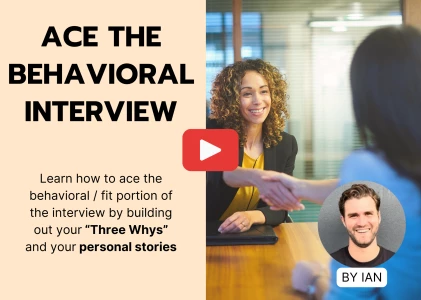The personal fit interview is a crucial part of the selection process in consulting. It’s often underestimated by candidates who tend to focus on the challenging case interviews only. But the personal fit interview is just as important! It’s all about determining if you’ll fit well within the team and align with the company culture. Read this article to find out why the personal fit interview matters so much and how to prepare effectively.
What to Expect in the Personal Fit Interview
The personal fit interview can take place at the beginning or end of the interview process, or sometimes between other interview segments. This varies depending on the company and interview structure. For example, McKinsey often conducts a "Personal Experience Interview" (PEI) at the start or right after the case interview, while other firms like Bain or BCG are more flexible with the format. The personal fit interview usually only lasts 10 to 15 minutes, but don’t take it too easy. Consulting is a people's-business, so it’s crucial that you not only convince on a professional, but also on a personal level. Interviewers want to see that you’ll fit in as a team player and will become a valuable colleague.
What Questions Are Asked in the Personal Fit Interview?
The Personal Fit Interview isn’t about your technical qualifications; instead, it’s about getting to know you. Interviewers want to find out what motivates you, how you respond to challenges, and which experiences have shaped you. Here are the three main question categories you can expect:

1. Resume Questions
Most personal fit interviews start with questions about your resume. This allows interviewers to learn about the experiences you’ve gained and the skills you bring. They also get a sense of how you reflect on your past roles, helping them understand your personality. Sample questions include:
- "Tell us about yourself."
- "What challenges have you overcome in your career so far?"
- "What areas did you focus on in your studies, and why?"
2. Stress Questions
Stress questions are designed to test your resilience, self-reflection, and emotional stability. They help interviewers to evaluate how you handle unexpected or challenging situations and assess your ability to stay calm under pressure. These questions often present provocative or uncomfortable scenarios, allowing them to observe your reaction. Common examples include:
- "Why were your grades low that semester?"
- "Are you really ready to make sacrifices for this job?"
- "Why should we choose you?"





